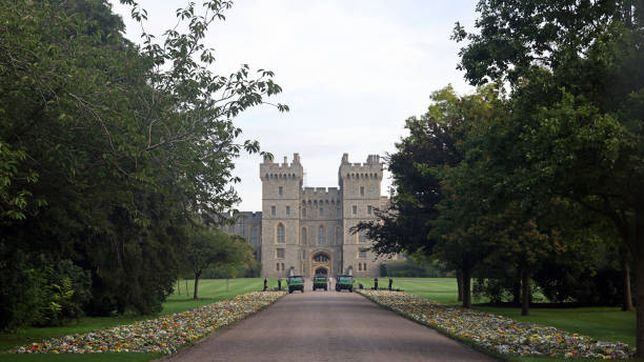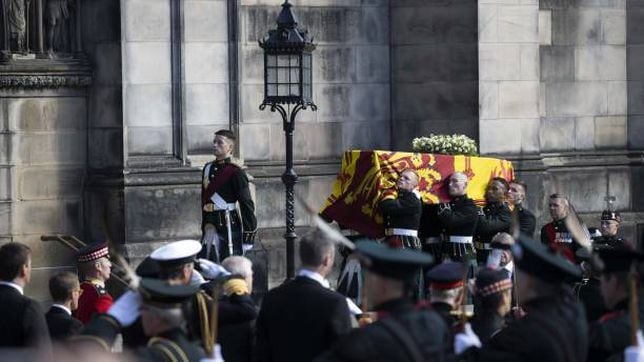Queen Elizabeth II funeral: how the day unfolded
Monday 19 September was an historic moment for the United Kingdom, as the country stopped to observe the long serving monarch’s funeral.
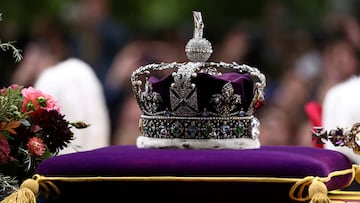
Show key events only
Headlines | 19 September 2022
- Queen Elizabeth's funeral took place today, Monday 19 September
- Prince Philip's coffin moved to be interred with Queen Elizabeth's coffin in King George VI memorial chapel
- Final committal ceremony held Monday evening with senior royals and Queen's staff
- Britain and the world say their last farewell to Queen Elizabeth
Recap of Queen Elizabeth's state funeral
Queen Elizabeth II was laid to rest today in the King George VI memorial chapel on the grounds of Windsor Castle after a state funeral. The funeral procession followed a 2.6 mile route through London lined by hundreds of thousands of mourners. Here's a look back on the funeral and the procession.
Queen's pets present for coffin's arrival at Windsor Castle
Queen Elizabeth enjoyed the company of her animals, so it was fitting that three of her favorites were present during the finale of the ceremonial procession.
Over her life she had more than 30 corgis and dorgis, receiving her first as a gift on her 18th birthday. She had two when she died at the age of 96, Muick and Sandy, who were brought outside Windsor Castle ahead of the coffin’s arrival on the Long Walk.
Another one of her passions were horses and horse riding. Standing just off the path to Windsor Castle was her Fell pony Emma, saddled but riderless.
Prince Philip's coffin moved to join his wife, Queen Elizabeth's
Following the state funeral, on Monday evening Elizabeth II was laid to rest in the King George VI memorial chapel, an annex to the St George's Chapel in the grounds of Windsor Castle.
The private committal ceremony was attended by around 800 mourners, including senior royals and members of the Queen's Household and Windsor estate staff.
The coffin of the Queen's husband, Prince Philip, who died last year, was moved from the Royal Vault so the two can be interred together.
Remembering Queen Elizabeth II at her happy place
Queen Elizabeth II died 8 September at her summer residence at Balmoral deep in the Scottish Highlands. Her beloved 50,000-acre country estate was acquired by her great-great-grandparents, Queen Victoria and Prince Albert, in 1852.
Upon ascending to the throne in 1952, she continued the family tradition of vacationing there each summer. In a 2016 TV documentary Eugenie, Elizabeth's granddaughter, said "Granny is most happy there."
Prince William and Princess Kate say goodbye to Queen Elizabeth II
The Prince and Princess of Wales, William and Kate, bid one final farewell to Queen Elizabeth II whose funeral took place today.
Following the death of Queen Elizabeth II, her eldest son Charles immediately succeeded her as King, but when will he be crowned?
King Charles III continued decades old tradition at Queen's funeral
The royal family leaving notes in the wreath of flowers atop the coffin can be traced back at least to 1952 with the death of King George VI, Queen Elizabeth's father. Close friend Winston Churchill left a note on the casket of the late monarch a courtesy that Queen Elizabeth II returned upon the passing of the former British prime minister in 1965.
The tradition has continued with the Queen doing so for her mother when she died in 2002 and her husband last year. Prince William wrote one for his mother, Lady Di, when she died in 1997.
The latest example was a note from King Charles III to his mother which read "In loving and devoted memory. Charles R.”
Symbolism for the end of Queen Elizabeth's reign
During the committal service for Queen Elizabeth II, her son King Charles III placed the Queen’s Company Camp Colour of the Grenadier Guards on the foot of the casket.
The crimson flag made from silk is a regimental flag which carries the official title of The Queen’s Company Colour Royal Standard of the Regiment, will be retired and be buried with the late monarch. The regiment will now become the King's Company.
After the flag was draped on the coffin, Lord Chamberlain, the most senior member of the Queen's staff who accompanied king Charles III, symbolically broke his Wand of Office. Along with the removal of the royal crown, orb and scepter, the breaking of the wand together symbolise the end of the Queen's reign.
Queen Elizabeth II, who reigned the United Kingdom for seven decades, has been a part of the fabric of life for the nation and the world at large. One of the most recognizable figures in the world, she has been a source of interest for many and even more so since her passing on 8 September.
There are numerous documentaries that trace the life of Her Royal Highness from different perspectives. As well fictional works for the silver screen and TV that attempt to give viewers a peek behind the curtain at the elusive personal side of this very publicly visible person.
While the internet and now plentiful streaming platforms have made accessing the films somewhat easier, unfortunately, they are not available in all regions. Here is a sampling of some of what is out there and where it can be viewed.
Queen Elizabeth's coffin drawn by British sailors and not horses, why?
When Queen Elizabeth's coffin was brought to Westminster Hall it was drawn by horses, but at her state funeral on Monday 142 sailors towed it to Westminster Abbey. This was not a quirk but part of a tradition begun over one hundred years ago because of a mishap.
At the 1901 funeral of the Queen's great-great-grandmother Queen Victoria, the horses that were supposed to drawn her coffin got tangled and then broke loose. Sailors stepped in to tow the casket on the State Gun Carriage of the Royal Navy.
The State Crown, Orb and Sceptre of Queen Elizabeth II removed from atop coffin
As Queen Elizabeth's coffin made its way through London to St George's Chapel in Windsor Castle visible atop the casket were three of the important and sacred symbols of the monarchy. The historical value of these pieces, which are normally exhibited in the Tower of London, is incalculable.
The crown of Saint Edward is a singular piece of royal jewelry which was created for the coronation of Charles II to replace the medieval crown cast in 1649. Present too, were the Scepter of the Cross and the Orb of the Sovereign, both created in 1661.
The public received a rare sighting of the St. Edward's Crown that was used during the coronation of Queen Elizabeth II as well as her father, King George IV.
The crown will also be used during the coronation of King Charles III which could take more than a year to plan. Read our full coverage for more details on the history of the crown.
Two members of the royal family were not seen in the traditional royal regalia during the funeral of Queen Elizabeth II: Prince Harry and Prince Andrew.
Prince Harry, the only member of the royal family to have served two tours in Afghanistan, was unable to wear his royal uniform because of the choice he and his wife, Meghan Markle, made to leave royal life.
On the other hand, Prince Andrew was stripped of his titles and roles within the family after being accused of sexual assault by a seventeen-year-old girl. Andrew had a long friendship with sex-trafficker Jeffery Epstein, who died under mysterious circumstances in August 2019.
Prime Minister of Pakistan offers condolences
Pakistan, a member of the Commonwealth of Nations, sent its Prime Minister to represent the country at the funeral of Queen Elizabeth II. During the events, Prime Minister Shehbaz Sharif was able to offer his condolences to King Charles III and Queen Consort Camilla.
Presidnet Biden is one of many foreign leaders who have made their way to London for the funeral of Queen Elizabeth II. The president visited Westminister Hall to pay his respects and also met briefly with King Charles III where he provided his condolences. Read our full coverage for more on what he told the new king who currently mourns the loss of his mother.
Foreign leaders came to London to celebrate the life of Queen Elizabeth II
While over five hundred members of government and heads of state descended on London for the funeral, there is one notable exception: Ukrainian President Volodymyr Zelenskyy. The president, who continues to lead his country through the invasion by Russia has opted to send a delegate in his place. When the news of the Queen's death was released, Presidnet Zelenskyy took to Twitter saying "It is with deep sadness that we learned of the death of Her Majesty Queen Elizabeth II. On behalf of the people, we extend sincere condolences to the royal family, the entire United Kingdom and the Commonwealth over this irreparable loss. Our thoughts and prayers are with you."
A gray morning welcomed guests to Queen Elizabeth II’s funeral on Monday morning in London.
An international and historical event brings together over two thousand personalities, from royal houses to heads of state and presidents of government. The funeral will be broadcast to almost every corner of the planet through television and social networks.
The security of all of these guests was one of the most difficult aspects of the event's planning. Read our full coverage to learn more about the precautions being taken.
Two minutes of silence falls over the United Kingdom
The two minutes of silence fell over the United Kingdom to show respect for the late Queen Elizabeth II.
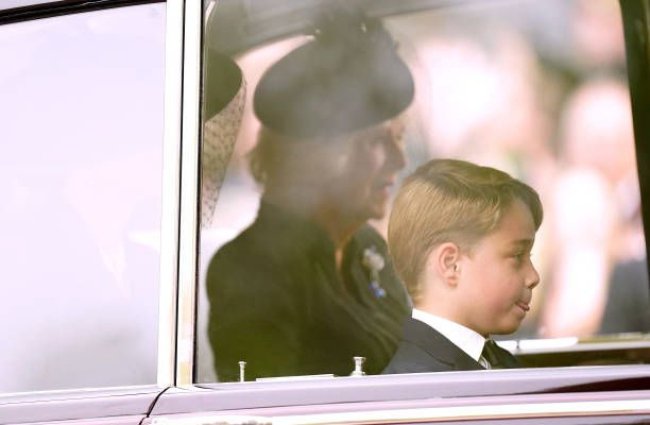
Queen-consort Camila and Prince George seen en route to Queen Elizabeth II's funeral
The royal family was the last group to enter Westminister Abbey, and images have been captured of them en route. Prince George of Cambridge, son of the Prince and Princess of Wales, was seen with Queen-consort Camilia, the wife of King Charles IIII. Along with his sister, Princess Charlotte of Cambridge, the two children were some of the youngest guests to attend the historic event.
Photo: Getty | WPA Pool
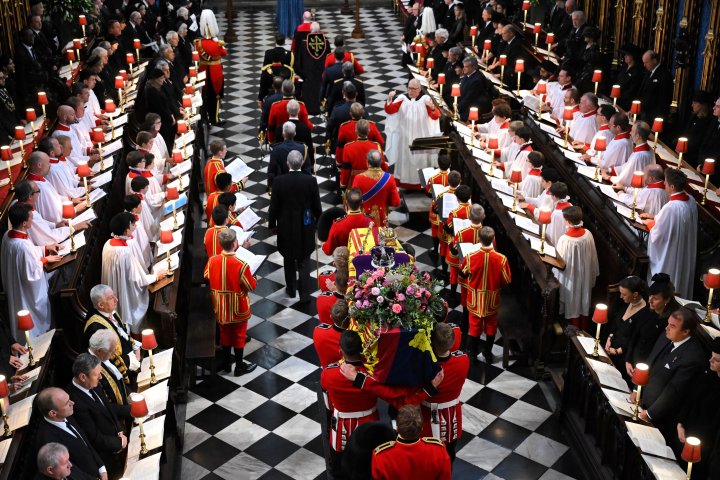
Archbishop of Canterbury Justin Welby delivers sermon
The Archbishop of Canterbury Justin Welby delivered his sermon to the congregation: "We will all face the merciful judgement of God. We can all share the Queen’s hope which in life and death inspired her servant leadership. Service in life, hope in death. All who follow the Queen’s example, and inspiration of trust and faith in God, can with her say: ‘We will meet again’".
The service continues at Westminster Abbey, where Queen Elizabeth married Prince Philip in 1947 and ascended the throne of the United Kingdom and Commonwealth on 6 February 1952 after the death of her Father, King George VI.
A sort while ago, British Prime Minister Liz Truss gave bible reading, followed by the hymn, The Lord's my Shepherd.
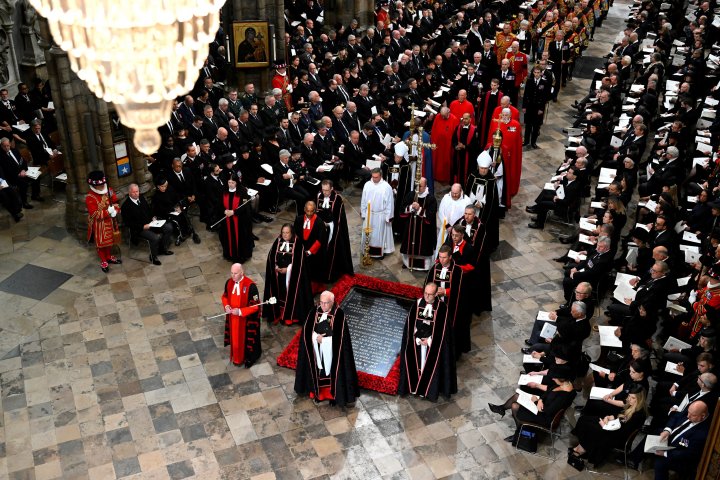
Prime Minister Liz Truss gives reading
The service continues at Westminster Abbey, where Queen Elizabeth married Prince Philip in 1947 and ascended the throne of the United Kingdom and Commonwealth on 6 February 1952 after the death of her Father, King George VI.
A sort while ago, British Prime Minister Liz Truss gave bible reading, followed by the hymn, The Lord's my Shepherd.
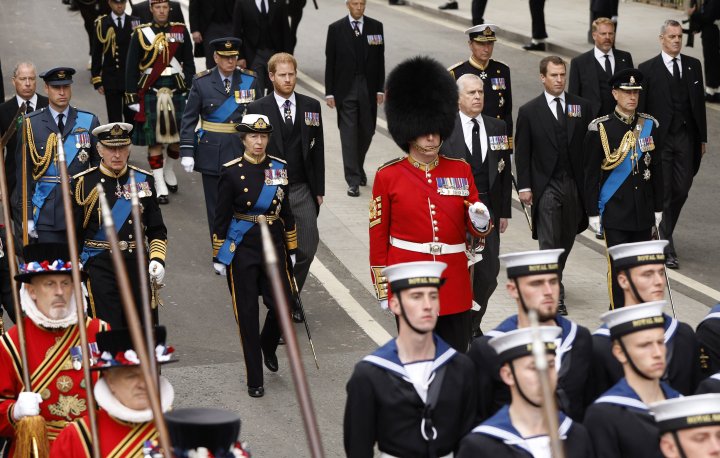
Royal procession follows the Queen on her final journey
King Charles, walking in procession to Westminster Abbey alongside Anne, The Princess Royal, Britain's William, Prince of Wales, Britain's Prince Harry, Duke of Sussex, and Prince Andrew.
PHOTO: JOHN SIBLEY / Reuters
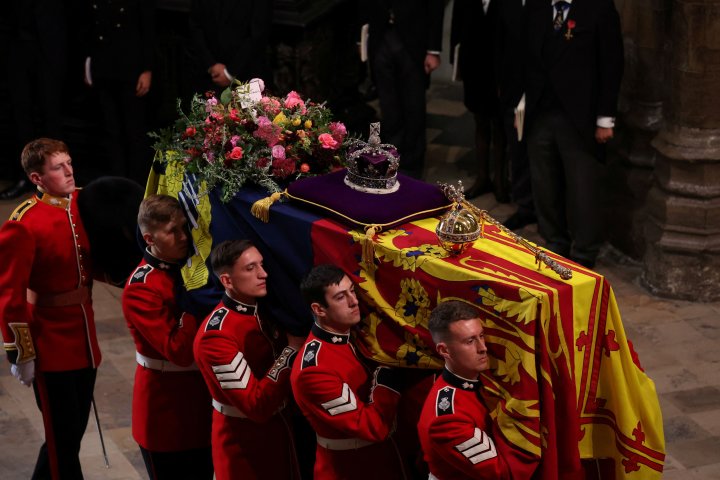
Queen's coffin arrives at Westminster Abbey
Britain's Queen Elizabeth's coffin arriving at Westminster Abbey at 11 a.m.
PHOTO: PHIL NOBLE / Reuters
David Hoyle, the Dean of Westminster Abbey will conduct Monday’s ceremony of Queen Elizabeth II’s funeral.
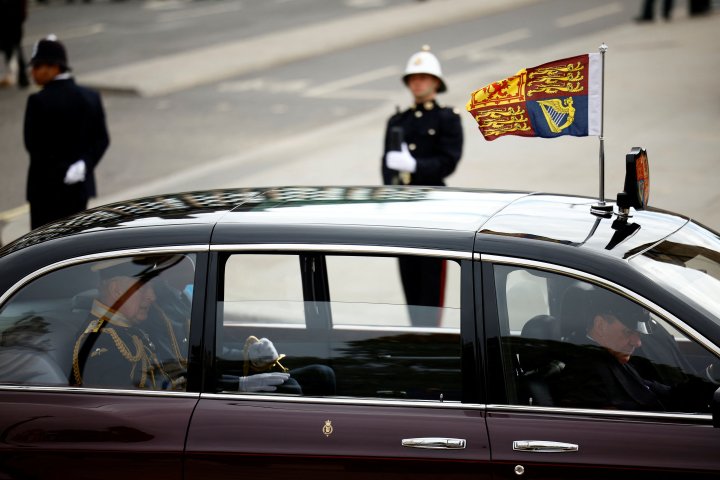
King Charles arrives to join procession
King Charles and William, Prince of Wales pictured arriving at Westminster Palace. A few minutes ago, at 10:44 a.m, the procession of the Queen's coffin from the Palace of Westminster to Westminster Abbey began accompanied by the State Gun Carriage of the Royal Navy.
PHOTO: SARAH MEYSSONNIER/Reuters
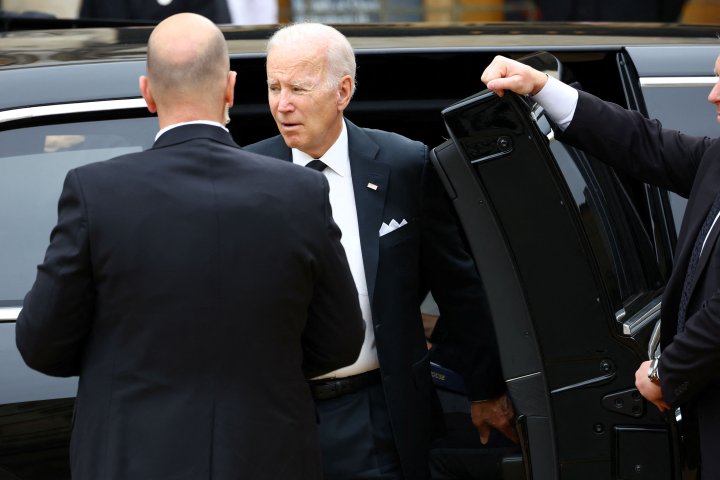
Guests continue to arrive at Westminster Abbey
US President Joe Biden pictured arriving at Westminster Abbey for HRH Queen Elizabeth II's funeral.
PHOTO: HANNAH MCKAY/Reuters
Westminster Abbey’s tenor bell tolls
Westminster Abbey’s muffled tenor bell has begun tolling once a minute for 96 minutes, reflecting the years of HM Queen Elizabeth’s life.
Royal mourners face rail disruption on journey to Windsor Castle
Trains travelling from London to Windsor, where Queen Elizabeth will be buried later on Monday were badly disrupted by technical problems, straining the public transport system as tens of thousands travel around the capital to watch her funeral.
Great Western Railway (GWR) said that all lines between Paddington and key connection point Reading, were blocked, advising passengers to take an alternative route to Windsor, the town that is home to the Windsor Castle royal residence.
Later, the queen's coffin is due to be driven to Windsor, where she will be buried alongside her late husband Prince Philip in a small chapel in a private ceremony after the funeral. Large crowds are expected throughout the capital.
Today, millions of people around the world will bid farewell to Queen Elizabeth II. Two minutes of silence will be observed in her memory instead of the usual one minute of silence.
Armed services at Wellington Barracks
Members of the military who will take part in the Queen's funeral today formed ranks at Wellington Barracks.
The procession will be led by 200 musicians of massed Pipes and Drums of Scottish and Irish Regiments, the Brigade of Gurkhas and the Royal Air Force, followed by The Kings, Heralds and Pursuivants of Arms and officers and senior members of The Queen’s household.
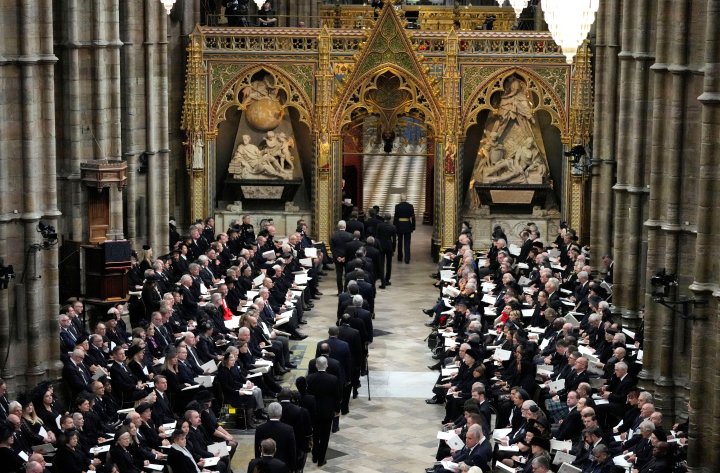
Guests arriving at Westminster Abbey
Guests pictured arriving prior to the State Funeral of Queen Elizabeth II at Westminster Abbey in central London this morning. The Queen, who died aged 96 on 8 September, will be buried at Windsor alongside her late husband, Prince Philip, who died last year.
PHOTO: Frank Augstein/Pool via REUTERS
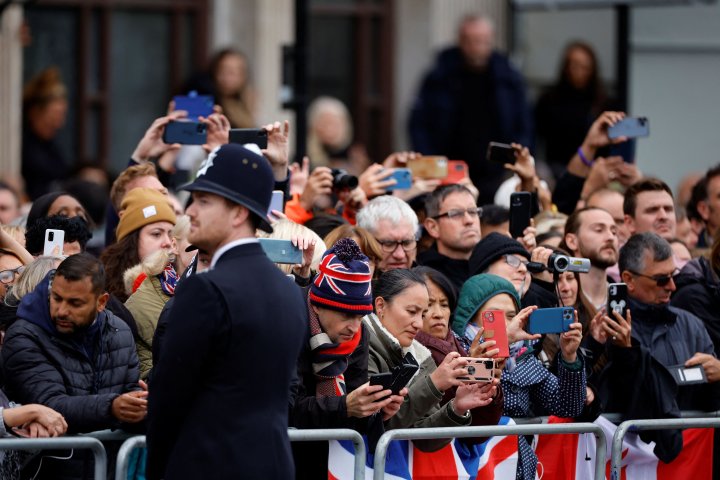
Queen's funeral procession viewing areas are now full to capacity
All the viewing areas from where members of the public can witness the funeral procession of Queen Elizabeth II have reached capacity, London's governing body said on Monday. City Hall said on Twitter that new arrivals would no longer be allowed entry. Tens of thousands of people have come to the capital to see the queen's coffin over the past few days, with her funeral due to begin at 11 a.m. local time (6 a.m. EDT / 3 a.m. PDT).
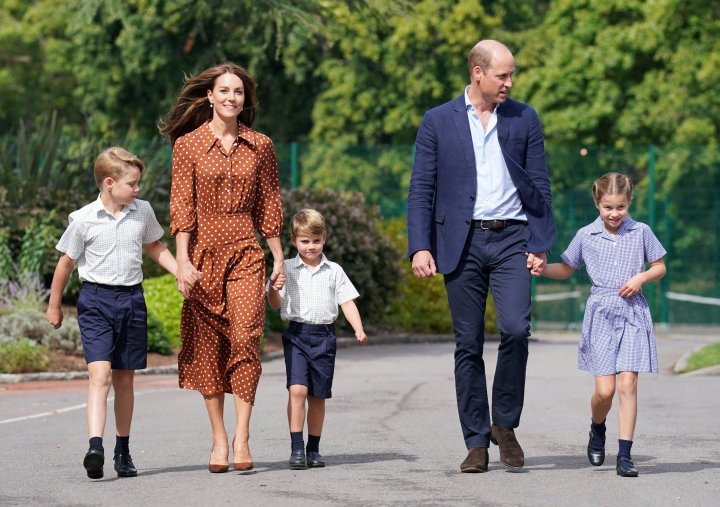
Prince George and Princess Charlotte to attend Queen Elizabeth II's funeral
Prince George and Princess Charlotte will be the among the 2,000 guests at the Queen's funeral in Westminster Abbey today. George, 9, and his seven-year-old sister will walk behind their parents, the Prince and Princess of Wales, in the procession, following the coffin as it enters the church.
Lord Heseltine: "We are witnessing British history"
Lord Heseltine spoke to Sky News about today's funeral of Queen Elizabeth II - a key moment in history which will be watched my millions the world over and its significance in terms of the former empire.
"I think it's impossible to overstate the significance. This event, is first and foremost, a tribute to Her Majesty herself - the deep love and affection in which she is held, is absolutely central to what is happening. But something else is happening. We are witnessing British history - the incredible role that this country has played over hundreds of years on the world stage. I think everybody who is watching and those that are attending realise that this is a momnent of history. There are things about the imperial process that raise questions. But here are all the all the former imperial powers, here as members of the Commonwealth - that is an extraordinary achievement and the monarchy has played an incredible part in that".
On Monday, after a day packed with processions, ceremonies, and services, the funeral of Queen Elizabeth II will end with her burial at St. George’s Chapel, which sits on the grounds of Windsor Castle.
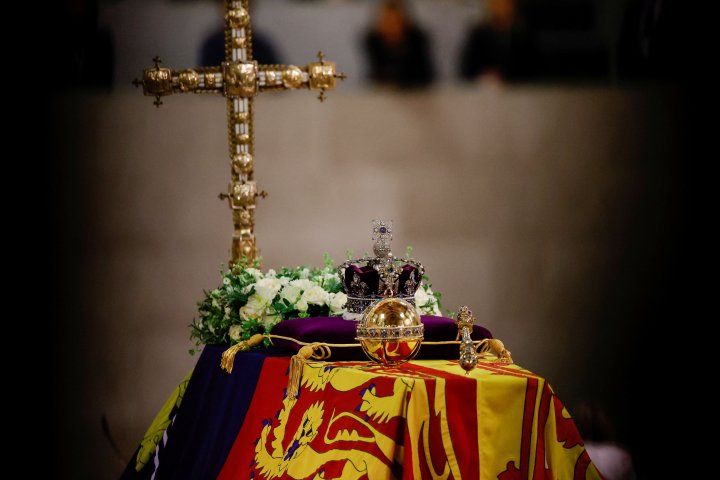
What is the committal service?
According to the order of events, the committal service will be held at St George’s Chapel at Windsor Castle at 4 p.m. this afternoon, following the funeral service at Westminster Abbey.
Alongside His Majesty The King and members of the Royal Family, the congregation will be made up of past and present members of The Queen’s Household, including from the private estates. Also in attendance will be Governors General and Realm Prime Ministers.
The official crown jeweller Mark Appleby will remove the imperial crown from the coffin to symbolically separate the Queen from her crown. With the help of the Bargemaster and a Serjeant of Arms, the Crown Jewels will be passed to the Dean who will place them on the High Altar.
As the coffin is lowered into the royal vault, the Dean will read a psalm and the commendation before the Garter King of Arms pronounces the many styles and titles of the Queen.
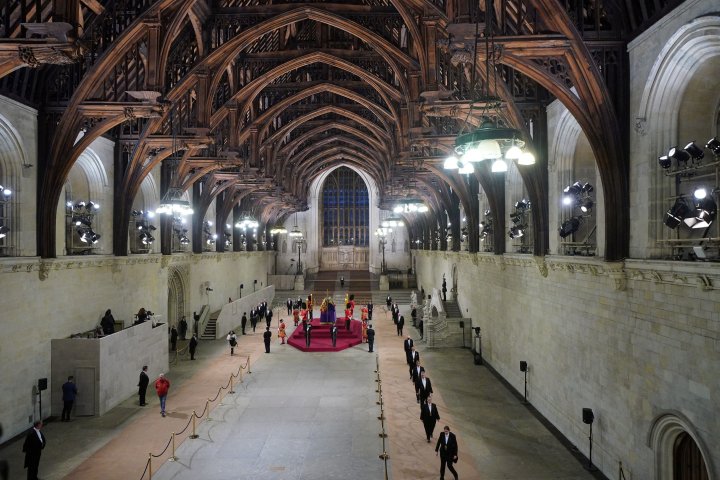
Final visitors pay their respects to the Queen at Westminster
This image, taken at 6:29 a.m. this morning shows the final members of the public paying their respects at the coffin of Queen Elizabeth II, draped in the Royal Standard with the Imperial State Crown and the Sovereign's orb and sceptre, lying in state on the catafalque in Westminster Hall, at the Palace of Westminster.
The lying-in-state-period officially ended at 6:30 a.m. Official figures as to the total number of mourners who attended will be released in the coming days but initial estimates put the figure at around one million.
IMAGE: Yui Mok/Pool via REUTERS
Queen Elizabeth II wrote a mysterious letter on one of her visits to Australia. Nobody knows its contents and it is kept in a vault of a building in Sydney.
Many leaders from around the world will descend on London on Monday for the funeral of Queen Elizabeth II. Let’s a look at who has confirmed the invitation.
Queen Elizabeth, a constant presence
During the past seven decades, Queen Elizabeth II was a constant presence in the lives of ordinary citizens in the United Kingdom and the Commonwealth - her face on coins, bank notes and stamps, her annual address at Christmas, her presence at key sporting events... her passing has been felt by everyone, as she was one of the few constants in our everyday lives.
The Longest Reign, available of BBC's iPlayer shows the impact she had.
The monarchs share blood ties: the Spaniard’s grandmother was the granddaughter of Queen Victoria, the great-great-grandmother of Elizabeth II.
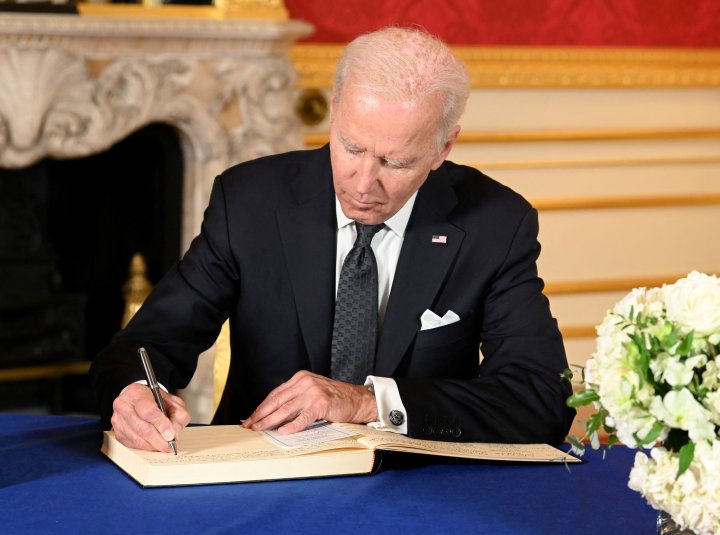
President Biden says Queen Elizabeth communicated dignity and service
US President Joe Biden said Queen Elizabeth II communicated dignity and a notion of service as he signed a book of condolence after viewing the late British monarch's coffin at her lying-in-state at Westminster Hall on Sunday. "Our hearts go out to the Royal Family," the US president said.
Eleven days after her death, world leaders and citizens will accompany the late monarch on her final journey, known as the Long Walk.
Message from King Charles
King Charles published a message in which he expressed his heartfelt gratitude to the general public for the support he has received during the period of mourning.
"Over the last ten days, my wife and I have been so deeply touched by the many messages of condolence and support we have received from this country and across the world.
"In London, Edinburgh, Hillsborough and Cardiff we were moved beyond measure by everyone who took the trouble to come and pay their respects to the lifelong service of my dear mother, The late Queen.
"As we all prepare to say our last farewell, I wanted simply to take this opportunity to say thank you to all those countless people who have been such a support and comfort to my Family and myself in this time of grief".
New portrait of Queen Elizabeth released
To mark HRM The Queen’s State Funeral, a new portait was released by the royal family. The photograph was taken in May this year to mark Her Majesty’s Platinum Jubilee - the first British Monarch to reach 70 years on the throne.
The photograph shows the Queen wearing aquamarine and diamond clip brooches which were an 18th birthday present from her father, George VI, in April 1944.
Millions are expected to follow Queen Elizabeth II's funeral live which will be broadcast live and live streamed around the world. Here are details about the route and how to watch it on TV.
Order of service for Queen Elizabeth's state funeral
The lying-in-state period ended at 6:30 a.m this morning and now the focus turns to the state funeral which has been meticulously planned. This is a summary of how the day will unfold:
The state funeral will take place in Westminster Abbey, central London, at 11 a.m. The funeral will be led by the Dean of Westminster David Hoyle, and the sermon will be given by the Archbishop of Canterbury Justin Welby.
Before the service, the Abbey's Tenor Bell will toll once a minute for 96 minutes - one toll for each year of the queen's life.
At the start of the service, as the queen's coffin is carried into the Abbey, the Sentences will be sung by the choir of Westminster Abbey. The five Sentences - lines of scripture set to music - have been used at every state funeral since the early 18th century.
The Dean of Westminster will give the bidding before the first hymn, and the Secretary-General of the Commonwealth, Baroness Scotland, will read the first lesson from the book of Corinthians.
A specially commissioned choral piece composed by the Master of the King's Music, Judith Weir, will be sung by the choir. The piece, Like as the Hart, is a setting of Psalm 42 to music.
The second lesson, from the Gospel of John, will be read by British Prime Minister Liz Truss, and will be followed by the hymn The Lord's my Shepherd. The hymn was also sung at the queen's wedding in 1947.
Following the sermon, the choir will sing the anthem My Soul, There is a Country. - Prayers will be said from the High Altar before the choir sings a short anthem, O Taste and See How Gracious the Lord is, which was composed by Ralph Vaughan Williams for the queen's coronation in 1953.
The Archbishop of Canterbury will give the commendation and the Dean of Westminster will pronounce the blessing.
Near the end of the funeral, at approximately 11:55 a.m., the Last Post will be sounded by the State Trumpeters of the Household Cavalry from the steps of the Lady Chapel. Two minutes' silence will then be observed across the United Kingdom.
The Reveille will be sounded by the State Trumpeters before the congregation sings God Save the King.
At the end of the funeral the Sovereign's Piper of the Royal Regiment of Scotland will play the traditional lament Sleep, Dearie, Sleep.
Afterwards, the bells of Westminster Abbey will be rung, fully muffled, which is the tradition following the funeral of the sovereign.
Queen Elizabeth II funeral live
Good morning and welcome to our live blog covering the funeral of Queen Elizabeth II, the United Kingdom's longest-serving monarch, who passed away on 8 September.
After 10 days of mourning, the Queen will be laid to rest later today at St. George’s Chapel, Windsor Castle. Before that, her life will be celebrated in a state funeral, attended by leaders and heads of state from all over the world, at Westminster Abbey. The event is expected to draw a record television audience.
The Queen has been lying in state at Westminster Hall for the past five days and the final visitors will file through to pay their respects up until 6:30 a.m.
We will be bringing you all of the latest news as the day prgresses.
/cloudfront-eu-central-1.images.arcpublishing.com/diarioas/Z5ZI37FVY3OI2S4ZX7E5JHXNUU.jpg)
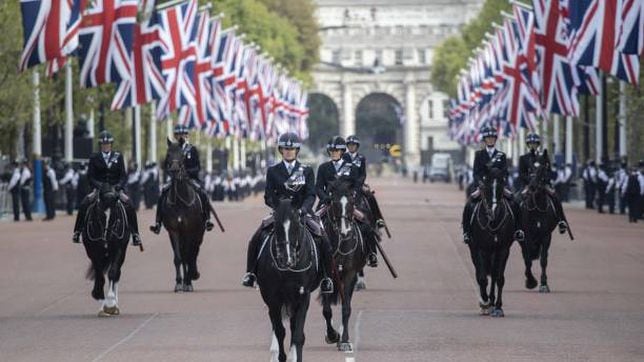
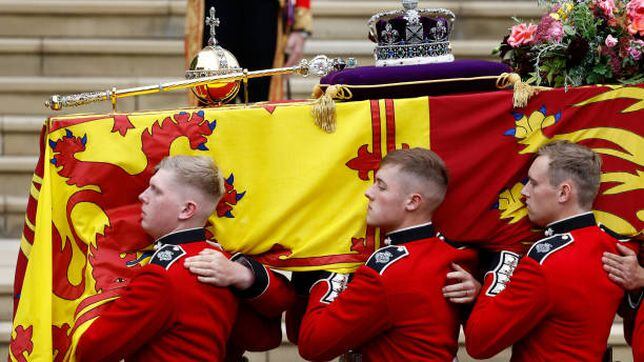
/cloudfront-eu-central-1.images.arcpublishing.com/diarioas/LYPCEHMFB7KI6OBW4XP2RPOTOI.jpg)
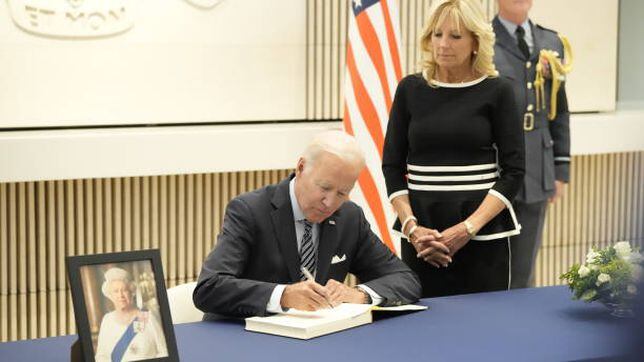
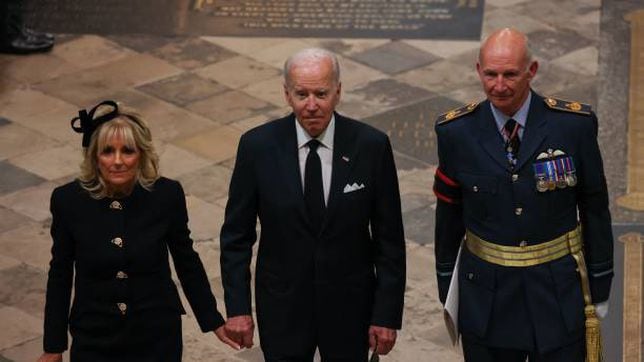
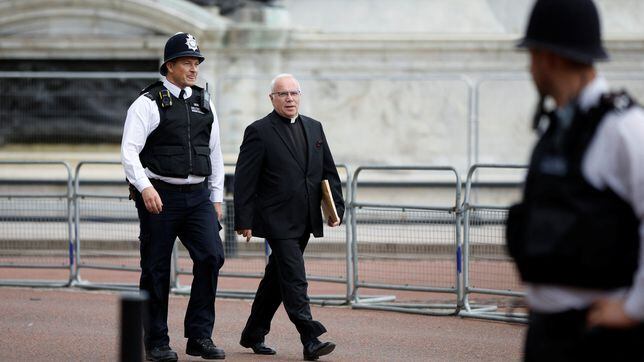
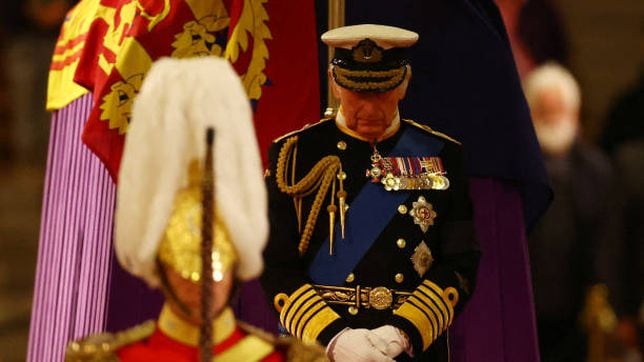
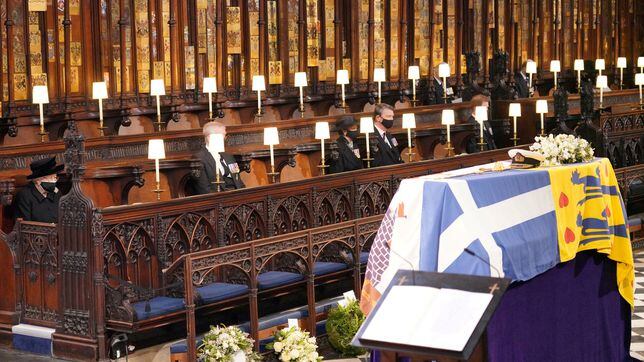
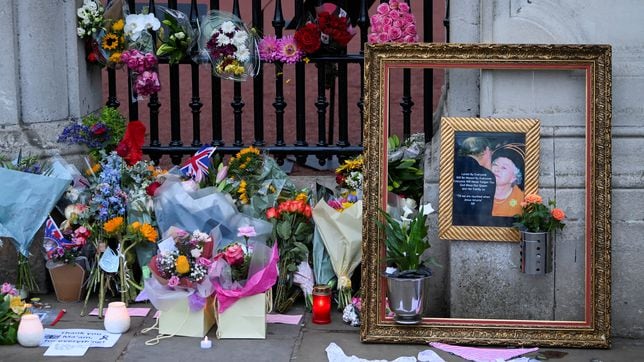
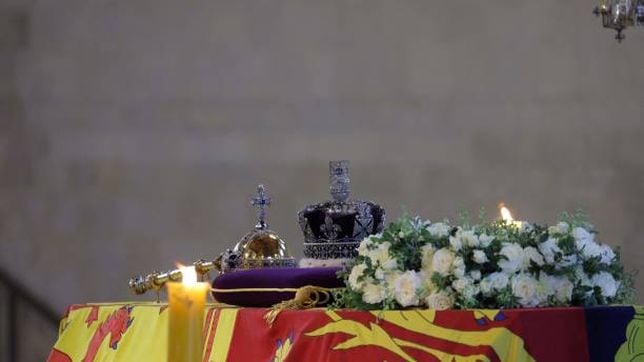
/cloudfront-eu-central-1.images.arcpublishing.com/diarioas/2PS6JAP7SJNG3DXEJTCVNE4DQY.jpg)
